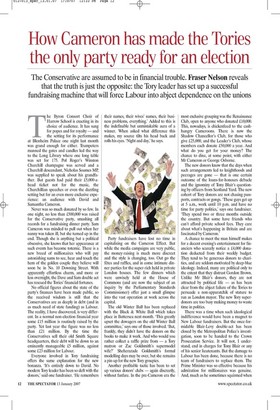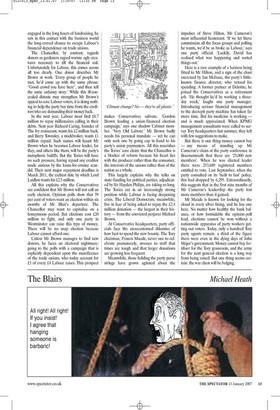How Cameron has made the Tories the only party ready for an election
The Conservative are assumed to be in financial trouble. Fraser Nelson reveals that the truth is just the opposite: the Tory leader has set up a successful fundraising machine that will force Labour into abject dependence on the unions The Byron Consort Choir of Harrow School is exacting in its choice of audience. It has sung for popes and for royalty — and the setting for its performance at Blenheim Palace one night last month was grand enough for either. Trumpeters manned the gates and candles led the way to the Long Library where one long table was set for 175. Pol Roger's Winston Churchill champagne was served and a Churchill descendant, Nicholas Soames MP, was supplied to speak about his grandfather. But guests had paid their £5,000-ahead ticket not for the music, the Churchillian speeches or even the dazzling setting but for an even more exclusive experience: an audience with David and Samantha Cameron.
Never was so much donated by so few. In one night, no less than £500,000 was raised for the Conservative party, smashing all records for a fundraising dinner party. Sam Cameron was minded to pull out when her nanny was taken ill, but she turned up in the end. Though she is anything but a political obsessive, she knows that her appearance at such events has become totemic. There is a new breed of millionaires who will pay astonishing sums to see, hear and touch the hem of the golden couple they believe will soon be in No. 10 Downing Street. With apparently effortless charm, and more or less overnight, the Dave and Sam double act has rescued the Tories' financial fortunes.
No official figures about the state of the party's finances have been made public, so the received wisdom is still that the Conservatives are as deeply in debt (and in as much need of state funding) as Labour. The reality, I have discovered, is very different. In a normal non-election financial year some £15 million is routinely raised by the party. Yet last year the figure was no less than £21 million By the time the Conservatives sell their old Smith Square headquarters, their debt will be down to an eminently manageable £5 million, against some £23 million for Labour.
Everyone involved in Tory fundraising offers the same explanation for the new bonanza. 'It's entirely down to David. No modern Tory leader has been so deft with the donors,' said one fundraiser. 'He remembers their names, their wives' names, their business problems, everything.' Added to this is the indefinable but unmistakable aura of a winner. When asked what difference this makes, my source tilts his head back and rolls his eyes. 'Night and day,' he says.
Party fundraisers have lost no time in capitalising on the Cameron Effect. But while the media campaigns are very public, the money-raising is much more discreet and the style is changing, too. Out go the fetes and raffles, and in come intimate dinner parties for the super-rich held in private London houses. The few dinners which were unwisely held at the House of Commons (and are now the subject of an inquiry by the Parliamentary Standards Commissioner) offer just a small glimpse into the vast operation at work across the capital.
The old Winter Ball has been replaced with the Black & White Ball which takes place in Battersea next month. 'This greatly upset the dowagers on the old Winter Ball committee,' says one of those involved. 'But, frankly, they didn't have the donors on the books to make it work. And who would you rather collect a raffle prize from — a Tory matron or Zac Goldsmith's supermodel wife?' Sheherazade Goldsmith's formal modelling days may be over, but she remains a pin-up for the new Tory groupies.
Another profitable tactic has been to set up various donors' clubs — again discreetly, without fanfare. In the pre-Cameron era the most exclusive grouping was the Renaissance Club, open to anyone who donated £10,000. This, nowadays, is chickenfeed to the cashhungry Cameroons. There is now the Shadow Chancellor's Club, for those who give £25,000, and the Leader's Club, whose members each donate £50,000 a year. And what do you get for your money? The chance to dine, at some point, with either Mr Cameron or George Osborne.
The new donors know that the days when such arrangements led to knighthoods and peerages are gone — that is one certain outcome of the loans-for-honours debacle and the ignominy of Tony Blair's questioning by officers from Scotland Yard. The new cohort of Tory donors are not chasing passports, contracts or gongs. 'These guys get up at 5 a.m., work until 10 p.m. and have no time for party politics,' says one fundraiser. 'They spend two or three months outside the country. But some have friends who can't afford private school fees. They care about what's happening in Britain and are fascinated by Cameron.'
A chance to meet the man himself makes for a decent evening's entertainment for financiers who scarcely notice a £4,000 donation deducted from their weekly budget. They tend to be generous donors to charities, and are seldom motivated by deep-blue ideology. Indeed, many are political only to the extent that they distrust Gordon Brown. Unlike Mr Blair's donors, they are not attracted by political life — as has been clear from the abject failure of the Tories to persuade a non-apparatchik of stature to run as London mayor. The new Tory superdonors are too busy making money to waste time in politics.
There was a time when such ideological indifference would have been a magnet to New Labour fundraisers. But the once-formidable Blair-Levy double-act has been closed by the Metropolitan Police's investigation, soon to be handed to the Crown Prosecution Service. It will not, I understand, end in charges for Tony Blair or any of his senior lieutenants. But the damage to Labour has been done, because there is no team of fundraisers to replace them. The Prime Minister was so effective because his admiration for millionaires was genuine. And, much as he sometimes squirmed when engaged in the long hours of fundraising, he saw in this contact with the business world the long-craved chance to escape Labour's financial dependence on trade unions.
The Chancellor, by contrast, regards donors as gardeners regard worms: ugly creatures necessary to till the financial soil. Unfortunately for Labour, this comes across all too clearly. One donor describes Mr Brown at work. 'Every group of people he met, he'd come up with the same phrase: "Good crowd you have here", and then tell the same unfunny story.' While this ill-concealed distaste may strengthen Mr Brown's appeal to core Labour voters, it is doing nothing to help the party buy time from the creditors who are demanding their money back.
In the next year, Labour must find £8.7 million to repay millionaires calling in their debts. Next year Richard Caring, founder of The Ivy restaurant, wants his £2 million back, and Barry Townsley, a stockbroker, wants £1 million repaid. Such names will haunt Mr Brown when he becomes Labour leader, for they, and others like them, will be the party's metaphoric bailiffs. But the Tories will have no such pressure, having repaid any creditor made anxious by the loans-for-ermine scandal. Their next major repayment deadline is March 2011, the earliest date by which Lord Laidlaw wants his £2.5 million All this explains why the Conservatives are confident that Mr Brown will not call an early election. Opinion polls show that 59 per cent of voters want an election within six months of Mr Blair's departure. The Chancellor may want to capitalise on a honeymoon period. But elections cost £20 million to fight, and only one party in Westminster can raise this type of money. There will be no snap election because Labour cannot afford one.
Unless Mr Brown manages to find new donors, he faces an electoral nightmare: going to the polls with a campaign that is explicitly dependent upon the munificence of the trade unions, who today account for £3 of every £4 Labour raises. This prospect makes Conservatives salivate. 'Gordon Brown leading a union-financed election campaign,' says one shadow Cabinet member. 'Very Old Labour.' Mr Brown badly needs his personal mandate — yet he can only seek one by going cap in hand to his party's union paymasters. All this nourishes the Tories' core claim: that the Chancellor is a blocker of reform because his heart lies with the producer rather than the consumer, the interests of the unions rather than of the nation as a whole.
This largely explains why the talks on state-funding for political parties, adjudicated by Sir Hayden Philips, are taking so long. The Tories are in an increasingly strong position while Labour is facing deepening crisis. The Liberal Democrats, meanwhile, live in fear of being asked to repay the £2.4 million donation — the largest in their history — from the convicted perjurer Michael Brown.
At Conservative headquarters, party officials face the unaccustomed dilemma of how best to spend the new bounty. The Tory chairman, Francis Maude, never one to celebrate prematurely, stresses to staff that times are tough and that larger donations are growing less frequent.
Meanwhile, those holding the party purse strings have grown agitated about the impulses of Steve Hilton, Mr Cameron's most influential lieutenant. `If we let Steve commission all the focus groups and polling he wants, we'd be as broke as Labour,' says one party official. 'Luckily, David has realised what was happening and sorted things out.'
Here is a rare example of a harness being fitted to Mr Hilton, and a sign of the clout exercised by Ian McIsaac, the party's littleknown finance director, who vetoed his spending. A former partner at Deloitte, he joined the Conservatives as a retirement job. 'He thought he'd be working a threeday week,' laughs one party manager. Introducing serious financial management to the decrepit party machine has taken far more time. But his medicine is working — and is much appreciated. When KPMG management consultants were called to survey Tory headquarters last summer, they left with few suggestions to make.
But there is one thing money cannot buy — any means of standing up Mr Cameron's claim at the party conference in Bournemouth that there are '25,000 new members'. When he was elected leader there were 253,689 registered members entitled to vote. Last September, when the party consulted on its 'built to last' policy, this had dropped by 6,295. Extraordinarily, this suggests that in the first nine months of Mr Cameron's leadership the party lost more members than it gained.
Mr Maude is known for looking for the cloud in every silver lining, and he has one here. No matter how healthy the bank balance, or how formidable the opinion-poll lead, elections cannot be won without a nationwide apparatus of party workers getting out voters. Today, only a hundred Tory party agents remain: a third of the figure there were even in the dying days of John Major's government. Money cannot buy fertiliser for the Tory grassroots, and the army for the next general election is a long way from being raised. But one thing seems certain: the war chest will be bulging.























































 Previous page
Previous page